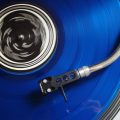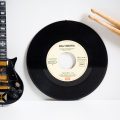Are you constantly plagued by that pesky record player static sound? Do you want to put an end to it once and for all?
Well, help is at hand with these handy and helpful 5 fixes that are guaranteed to put an end to that pesky static sound once and for all.

Table of Contents
- What Causes That Annoying Sound?
- How to Reduce Crackle on Vinyl Records
- Final Tones
- FAQs Record Player Static Sound
What Causes That Annoying Sound?
There are a number of reasons that vinyl records can sometimes exhibit a bip in sound quality and elicit that annoying static sound – we will be exploring 4 of them below:
1. Static Build-up
Yes, as might be a little obvious, the static sound that your vinyl record is currently hosting could easily be caused by a build-up of static on the surface of the record or within the record grooves. Indeed, before you go surfing the web for a whole host of different audio components, you might just as easily absolve your dirty record of its linear cut record groove and use an anti-static brush (pictured below).
2. Dirt & Dust
If you don’t already know how to clean a vinyl record properly, then you might want to read up on the subject, for dirt and dust can very easily find themselves embedded within the grooves themselves.
Those not looking to put any real effort into the same process of cleaning that you might otherwise use to clean other household objects, you can always just clean the record with soap and water.
Yes, believe it or not, even when using soap and water to clean a record, a turntable sounds good. It is worth cleaning a record on a semi-regular basis, whether you use more adept machines like the Groovewasher or simply just use homegrown methods as alluded to above.
3. Scratches, etc.
Similarly, the issue of bad sound quality as a result of a static sound might be to do with inherent damage to the surface of the record. In such instances, no amount of fiddling with the phono input or phono preamp will help to reduce the distorted sound. In fact, there isn’t much that can be done to remedy the issue. The record will likely sound distorted no matter what you do.
Some suggest that you can use poly-filler or another appliance filler to fill in the gaps left by significant gashes in a record though this is largely uncorroborated or completely advised against by audiophiles.
The reason for this is precisely because the use of such a method could do more harm to other parts of a turntable instead of helping the overall user experience. Namely, this could do significant damage to the stylus, for it is not designed to meet this substance or material. There are, however, some more amateur methods worthy of your consideration.
4. Flaws in the Press
Even if you are as careful as possible with a record after you have bought it, there is always the possibility that the record was not pressed properly in the first place. In such cases, no matter how hard you try to clean and rectify a record, there is seemingly no getting past this inherent damage.
Such damage will usually rear its head in the form of warping. Most warping, though potentially damaging to the stylus and cartridge over time, is insignificant enough that it can be overcome. Some, however, are a little more significant and, thus, will require you to learn how to fix a warped record. This isn’t always possible and should be approached with caution. If, though, you are desperate then by all means go forth and get fixing.
How to Reduce Crackle on Vinyl Records
So, now we understand at least a few of the reasons that records can sometimes exhibit a static sound, we can begin to explore how you can go about reducing this static sound as much as possible.
Method 1: Anti-Static Sleeves
Those looking to adopt a more long-term solution to the problem might think about investing in some anti-static record sleeves. Not only will they keep your records looking neat and tidy, but they will also, by their very chemical composition, reduce and prevent the build-up of static.
Typically made from High-Density Polyethylene (HDPE), these sleeves are chemically concocted to eschew the development of static wherever it might otherwise rear its crackly head.
Method 2: Anti-Static Brush
As previously mentioned, you can’t really go wrong with a good anti-static record brush. A simple sweep of the record after every use is bound to keep that pesky static sound at bay, particularly if used in conjunction with those High-Density Polyethylene record sleeves (pictured above).
Many audiophiles would argue that a solid and regular cleaning routine is what it is all about. Opponents of this philosophy might suggest that it sucks the fun and spontaneity out of listening to and collecting records.
There are, of course, benefits and drawbacks to both poles of this argument. Audiophiles are right to suggest that a cleaning routine like this will ensure that your records have a long life. Equally, opponents of this philosophy are right to suggest that being a stickler for such things has the potential to spoil what is otherwise a fun and exciting hobby.
Method 3: Deep Clean
Of course, though you may keep up a regular habit of dusting off your records every time you listen to them, you really can’t go wrong with a deep clean every now and then to ensure that the grooves are being manicured to their fullest.
As already elucidated above, you can just as easily clean a record with some soap and water as you can do so with a professional product like the Spin Clean Record Washer (pictured below). Those looking to make more of an enterprise through the buying and selling of records might wish to opt for the latter even if only to save their skin.
Method 4: Clean Stylus, Clean Mind
While you’re at it, why not give your stylus a good clean to ensure that any static that is hanging on knows where the door is and finds it pronto?
Unlike the surface of a record, it is not recommended that you clean it with any old soap or water. Rather, you should use a dedicated cleaning solution and, preferably, a cleaning brush. Thankfully, the folks over at Groovewasher have got you covered with this stylus cleaning kit (below).
Method 5: Treat ‘Em Right
Above all of this, though, you should ensure that you are treating your records right at all times. If you want to be serious about record collecting, then you have to treat your records with respect at all times, not just when it suits you or when it looks good in front of others.
In this way, you might want to brush up on how to go about storing records properly. Sure, record collecting is a personal enterprise to engage in, but there are a few unwritten rules and regulations that it is wise to follow, lest you be left with a whole record collection’s worth of scratches and scrawls.
It can be all too easy to slack from time to time, though, so don’t be too hard on yourself. Just try your best.
Final Tones
So, there you have it! Hopefully, you are now feeling ready and able to eliminate that pesky static sound from your record player once and for all, showing it the door and the proverbial way out.
FAQs Record Player Static Sound
Why does my record player sound static?
This could be for any of a number of reasons, though this issue usually centers around either a) the build-up of static on the record or needle, b) dirt and dust in the grooves of the record, c) flaws in the pressing of the record itself, or d) scratches on the record.
Are record players supposed to sound fuzzy?
Not unless the music you are playing contains these fuzzy sounds. This sounds like it’s more an issue with dust clotting the function of the needle than anything to do with the record.
Is static normal on a record player?
The record player is an inherently imperfect medium, inviting all sorts of foreign contaminants into the fray to come and play. In this way, it is normal for there to be a little bit of static in the course of things every now and then.
Can static damage vinyl records?
Static has a habit of turning records into dust magnets which, in turn, can cause significant damage not only to the record but also to the needle, which, in turn, causes more concentrated damage to the record, etc.









